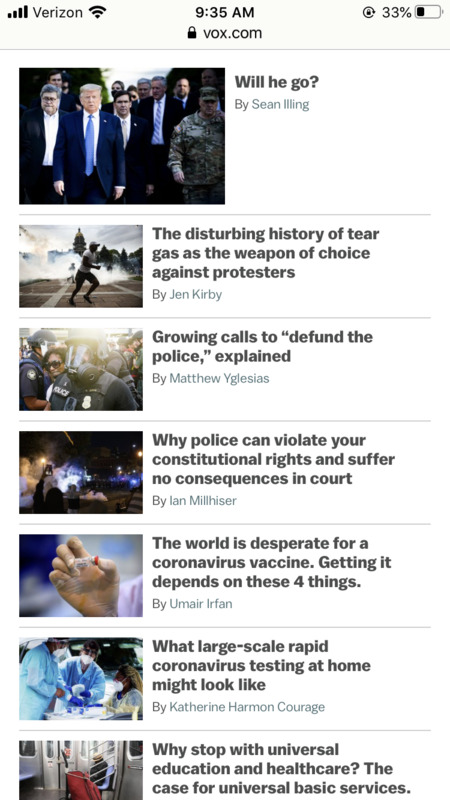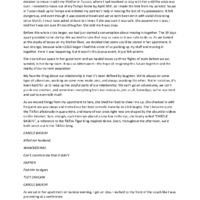Item
A Question of Trauma
Title (Dublin Core)
A Question of Trauma
Description (Dublin Core)
This is a screenshot of the headlines on Vox News from June 3, 2020. Of the seven articles shown here, three are about healthcare (with two specific to COVID), three are about police brutality (including one about police using tear gas on protesters), and the lead story is speculation on whether or not Trump will leave office if he loses this upcoming election. Seeing a screenshot of what the daily news looked like throughout this pandemic is important for future historians because the experience of scrolling through the headlines and worrying simultaneously about a raging global pandemic, an emboldened police state, and a descent into authoritarianism helps explain why many people are describing the last few months as "traumatic."
A mention of trauma warrants a careful reflection of the question "Traumatic for whom?" The centrality of white supremacy-- the disproportionate rate of COVID infections and deaths among Black and Indigenous People of Color; the disproportionate impact of police violence on Black, Indigenous, and Latinx communities; and the weaponization of whiteness that allowed Trump's election in the first place-- has left many to comment on the ways in which this current moment is uniquely traumatic for People of Color and especially Black and Indigenous people. While communities of color have been condemning state violence for generations, some scholars have speculated on the uniqueness of this moment, arguing that a combination of disillusionment--as people watched the government fail to provide even the most basic protections against the virus-- and increased virtual presence-- as social media was flooded with videos of police brutalizing both citizens and protesters-- have forced white Americans to confront the extensive and devastating impacts of systemic racism in new ways. Although many white people have decried police violence and themselves donated or marched in the past few weeks, shortcomings regarding allyship have been well documented, and it's difficult to say whether or not white Americans' newfound commitments to anti-racism will be part of a better post-coronavirus World or disappointingly just another short-lived pandemic trend.
As a white scholar who is not an expert on questions of race or Critical Race Theory, my description of these events is almost certainly clumsy and incomplete. While my perspective is both limited and flawed, it seems as though the extent and depth of the trauma of this moment-- to individuals, to communities, and to our nation-- is still very much unfolding.
A mention of trauma warrants a careful reflection of the question "Traumatic for whom?" The centrality of white supremacy-- the disproportionate rate of COVID infections and deaths among Black and Indigenous People of Color; the disproportionate impact of police violence on Black, Indigenous, and Latinx communities; and the weaponization of whiteness that allowed Trump's election in the first place-- has left many to comment on the ways in which this current moment is uniquely traumatic for People of Color and especially Black and Indigenous people. While communities of color have been condemning state violence for generations, some scholars have speculated on the uniqueness of this moment, arguing that a combination of disillusionment--as people watched the government fail to provide even the most basic protections against the virus-- and increased virtual presence-- as social media was flooded with videos of police brutalizing both citizens and protesters-- have forced white Americans to confront the extensive and devastating impacts of systemic racism in new ways. Although many white people have decried police violence and themselves donated or marched in the past few weeks, shortcomings regarding allyship have been well documented, and it's difficult to say whether or not white Americans' newfound commitments to anti-racism will be part of a better post-coronavirus World or disappointingly just another short-lived pandemic trend.
As a white scholar who is not an expert on questions of race or Critical Race Theory, my description of these events is almost certainly clumsy and incomplete. While my perspective is both limited and flawed, it seems as though the extent and depth of the trauma of this moment-- to individuals, to communities, and to our nation-- is still very much unfolding.
Date (Dublin Core)
June 3, 2020
Creator (Dublin Core)
Vox News
Contributor (Dublin Core)
Carolyn Evans
Type (Dublin Core)
screenshot
Publisher (Dublin Core)
Vox News
Controlled Vocabulary (Dublin Core)
English
Conflict
English
Emotion
English
Government Federal
English
News coverage
English
Politics
English
Protest
English
Social Issues
English
Race & Ethnicity
Curator's Tags (Omeka Classic)
trauma
election
police
Collection (Dublin Core)
Law Enforcement
Social Justice
Latino(a/x) Voices
Linked Data (Dublin Core)
Date Submitted (Dublin Core)
06/22/2020
Date Modified (Dublin Core)
07/07/2020
02/04/2021
Date Created (Dublin Core)
06/03/2020
Item sets
This item was submitted on June 22, 2020 by Carolyn Evans using the form “Share Your Story” on the site “A Journal of the Plague Year”: http://mail.covid-19archive.org/s/archive
Click here to view the collected data.

